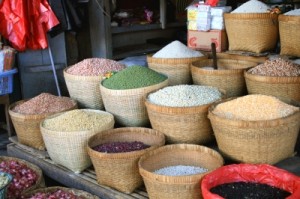Legumes: enrichment for our life!
 Legumes are a group of very healthy protein foods that must be included in diets to make them balanced. Legumes are not fat, because they are very nutritious and lack a high energy density. Approximately thirty percent of the calories provided by legumes are not used by the organism.
Legumes are a group of very healthy protein foods that must be included in diets to make them balanced. Legumes are not fat, because they are very nutritious and lack a high energy density. Approximately thirty percent of the calories provided by legumes are not used by the organism.
Due to their high protein and to the small space that is required for its production, the fruits and the seeds of legumes are an important part of the human diet almost anywhere in the world.
Tips:
When you shop for legumes, please note the expiration date on their package. Legumes should be stored in a dark and well ventilated place, and for not more than one year.
Peeled legumes should be placed in water for at least 7 or 8 hours, even though 12 hours would be best. Exception: for lentils, you’d rather use boiled water to soak them and plenty of warm water to wash the peas with.
Add salt only after they’re cooked.
The most common varieties of legumes are:
Soy
Chickpeas
Lima Beans
Beans
Broad Beans
Green beans
White beans
Common Beans
Lentils
Carob
The nutrients that legumes have are:
Fiber
Proteins
Isoflavones
Iron
Calcium
Phosphorus
Magnesium
Zinc
Potassium
Phytoestrogens
Vitamins B1, B2 and B3
Unsaturated fats
Folic acid
Amino acids
Carbohydrates
The benefits of legumes in our health are:
they help to lose weight;
they regulate cholesterol;
they control menopause symptoms;
they help to eliminate toxins from the organism;
They neutralize the action of free radicals.
They also prevent constipation, diabetes and anemia; they reduce the risk of cardiovascular diseases and cancer. They help by collaborating in the formation of bones.
Legumes are very healthy, so their use is highly recommended at least twice a week.






Leave a Reply